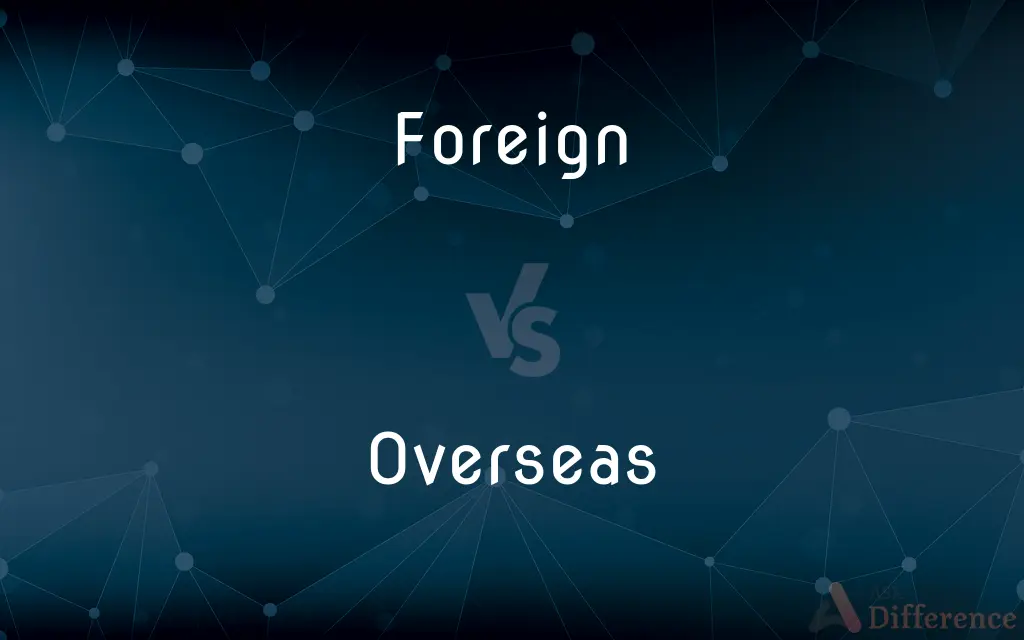Foreign vs. Overseas — What's the Difference?
By Tayyaba Rehman & Urooj Arif — Updated on March 16, 2024
Foreign refers to anything related to or originating from a country other than one's own, emphasizing difference, whereas overseas specifically denotes something located across a sea or ocean from one's home country, highlighting geographical distance.

Difference Between Foreign and Overseas
Table of Contents
ADVERTISEMENT
Key Differences
Foreign is a broad term that encompasses anything from another country, highlighting differences in culture, law, or origin. It can apply to people, products, companies, or practices that are not native to one's own country. Overseas, on the other hand, specifically refers to locations or entities across a sea or ocean from the speaker's or subject's home country. The term inherently includes a geographical component, suggesting a significant physical distance.
The emphasis with "foreign" is on the distinction and origin from another nation, regardless of geographical distance. For instance, a foreign film in the United States could be from Canada, sharing a land border, or from a distant country like Japan. Overseas does not solely imply a difference in nationality or culture but focuses on the physical separation by large bodies of water. For example, for someone in the UK, "overseas" could refer to the United States or Australia, both of which are across oceans.
While "foreign" can apply to any country that is not one’s own, including neighboring countries without any sea or ocean between them, "overseas" implies a more substantial, physical, and often logistical separation. This distinction is particularly relevant in contexts like travel, shipping, and international relations, where the physical distance and the challenges it presents are significant factors.
In some contexts, the terms may be used interchangeably, especially when the distinction between geographical distance and international borders is not the primary focus. However, when specificity is required, "overseas" conveys a clearer picture of geographical and logistical considerations, whereas "foreign" emphasizes the origin from another country or the presence of differences without necessarily implying a significant physical distance.
The choice between using "foreign" and "overseas" can also reflect the speaker's perspective on international engagement. Using "foreign" might indicate an emphasis on cultural, legal, or economic differences, while "overseas" might suggest a viewpoint more focused on global positioning and the physical aspects of international interactions.
ADVERTISEMENT
Comparison Chart
Definition
Pertaining to something from a different country.
Referring to something located across a sea or ocean.
Emphasis
Cultural, legal, or origin difference.
Geographical distance and separation by water.
Application
People, products, companies, practices from another country.
Locations, entities, or activities across sea or ocean.
Geographic Specificity
Not specific to geography; can include neighboring countries.
Specifically implies distance and separation by water.
Context of Use
Broad, including cultural or economic relations.
Often used in travel, shipping, and global logistics.
Example
A foreign film could be from a neighboring country.
Overseas travel usually involves crossing an ocean.
Compare with Definitions
Foreign
Different or unfamiliar.
The concept of siesta was foreign to him.
Overseas
In or to a foreign country across the sea.
They moved overseas for work.
Foreign
Relating to or originating from another country.
He enjoys learning foreign languages.
Overseas
Pertaining to regions or countries across the ocean.
Overseas territories often have unique legal statuses.
Foreign
Outside one’s direct experience or knowledge.
The idea of living abroad was once foreign to her.
Overseas
Involving travel or communication across the sea.
Overseas shipping costs can be high.
Foreign
Not native or belonging to one's own country.
Foreign products dominate the local market.
Overseas
Located beyond one's country's sea boundaries.
The company expanded its operations overseas.
Foreign
Involving or dealing with other nations.
She works in the foreign service.
Overseas
Engaging with countries or markets across oceans.
He specializes in overseas investments.
Foreign
Located away from one's native country
On business in a foreign city.
Overseas
In or to a foreign country, especially one across the sea
He spent quite a lot of time working overseas
Foreign
Of, characteristic of, or from a place or country other than the one being considered
A foreign custom.
Overseas
From, to, or relating to a foreign country, especially one across the sea
Overseas trips
Foreign
Conducted or involved with other nations or governments; not domestic
Foreign trade.
Overseas
Beyond the sea; abroad.
Foreign
Situated in an abnormal or improper place in the body and typically introduced from outside
A foreign object in the eye.
Overseas
Of, relating to, originating in, or situated in countries across the sea.
Foreign
Not natural; alien
Jealousy is foreign to her nature.
Overseas
Abroad.
Overseas branches of the company are doing well.
Foreign
Not germane; irrelevant.
Overseas
Used with ethnicities, nationalities, or religious affiliations: living (being resident) in a foreign country.
Overseas Chinese communities exist in North and South America.
Foreign
Subject to the jurisdiction of another political unit.
Overseas
Across a sea; to or in an area across a sea.
Her overseas trip went well.
Foreign
Located outside a country or place, especially one's own.
Foreign markets; foreign soil
He liked visiting foreign cities.
Overseas
Abroad.
He emigrated and now lives overseas.
Foreign
Originating from, characteristic of, belonging to, or being a citizen of a country or place other than the one under discussion.
Foreign car; foreign word; foreign citizen; foreign trade
There are many more foreign students in Europe since the Erasmus scheme started.
Overseas
Across a sea; to an area across a sea.
She travelled overseas.
Foreign
Relating to a different nation.
Foreign policy; foreign navies
Overseas
In a foreign country;
Markets abroad
Overseas markets
Foreign
Not characteristic of or naturally taken in by an organism or system.
Foreign body;foreign substance;foreign gene;foreign species
Overseas
Being or passing over or across the sea;
Some overseas trade in grain arose
Foreign
Alien; strange.
It was completely foreign to their way of thinking.
Overseas
Beyond or across the sea;
He lived overseas for many years
Foreign
(obsolete) Held at a distance; excluded; exiled.
Overseas
In a place across an ocean
Foreign
From a different one of the states of the United States, as of a state of residence or incorporation.
Foreign
Belonging to a different organization, company etc.
My bank charges me $2.50 every time I use a foreign ATM.
Foreign
Outside, outdoors, outdoor.
Foreign
A foreign person, particularly:
Foreign
A foreigner: a person from another country.
Foreign
An outsider: a person from another place or group.
Foreign
A non-guildmember.
Foreign
A foreign vehicle, particularly:
Foreign
(obsolete) A foreign ship.
Foreign
(slang) A foreign whip, a car produced abroad.
Foreign
Clipping of chamber foreign: an outhouse.
Foreign
A foreign area, particularly:
Foreign
An area of a community that lies outside the legal town or parish limits.
Foreign
An area of a monastery outside its legal limits or serving as an outer court.
Foreign
Short for various phrases, including foreign language, foreign parts, and foreign service.
Foreign
Outside; extraneous; separated; alien; as, a foreign country; a foreign government.
Foreign
Not native or belonging to a certain country; born in or belonging to another country, nation, sovereignty, or locality; as, a foreign language; foreign fruits.
Hail, foreign wonder!Whom certain these rough shades did never breed.
Foreign
Remote; distant; strange; not belonging; not connected; not pertaining or pertient; not appropriate; not harmonious; not agreeable; not congenial; - with to or from; as, foreign to the purpose; foreign to one's nature.
This design is not foreign from some people's thoughts.
Foreign
Held at a distance; excluded; exiled.
Kept him a foreign man still; which so grieved him,That he ran mad and died.
Foreign
Of concern to or concerning the affairs of other nations (other than your own);
Foreign trade
A foreign office
Foreign
Relating to or originating in or characteristic of another place or part of the world;
Foreign nations
A foreign accent
On business in a foreign city
Foreign
Not contained in or deriving from the essential nature of something;
An economic theory alien to the spirit of capitalism
The mysticism so foreign to the French mind and temper
Jealousy is foreign to her nature
Foreign
Not belonging to that in which it is contained; introduced from an outside source;
Water free of extraneous matter
Foreign particles in milk
Common Curiosities
Can a neighboring country be considered overseas?
Generally, neighboring countries are not considered overseas unless separated by a sea or ocean. The term "overseas" implies a significant geographical distance across water.
Is everything overseas also foreign?
Yes, everything overseas is also foreign as it originates from or is located in a country other than one's own. However, not all foreign things are overseas, as they may come from neighboring countries without crossing water.
Why might someone prefer to use "overseas" instead of "foreign"?
Someone might prefer "overseas" to emphasize the geographical distance and the challenges or experiences associated with crossing seas or oceans, especially in contexts related to travel, shipping, or global expansion.
How do foreign policies differ from overseas investments?
Foreign policies refer to a government's strategies in dealing with other nations, focusing on political, economic, and social interactions, whereas overseas investments specifically involve putting resources into ventures or markets across seas or oceans, highlighting the financial aspect and geographical distance.
What does foreign mean?
Foreign refers to anything related to or originating from a country other than one's own, emphasizing differences in culture, law, or origin.
What does overseas mean?
Overseas specifically denotes something located across a sea or ocean from one's home country, highlighting geographical distance.
Can digital platforms be considered overseas?
Digital platforms themselves are not geographically bound and thus not overseas. However, companies operating such platforms can be based overseas if they are located across seas or oceans from the user's home country.
Are overseas territories considered foreign?
Overseas territories might not be considered foreign in the context of the country to which they belong but are foreign relative to other countries. Their "overseas" status highlights their geographical distance from the main territory.
How do cultural differences relate to the terms foreign and overseas?
Cultural differences are more directly associated with the term "foreign," which emphasizes the distinctiveness and origin of practices, people, or items from another country, regardless of geographical distance.
What impact does globalization have on the concepts of foreign and overseas?
Globalization blurs the distinctions by increasing interconnectedness, making foreign cultures and overseas locations more accessible and familiar, thus diminishing the perceived distance and difference.
Share Your Discovery

Previous Comparison
Grimace vs. Wince
Next Comparison
Chubby vs. ChunkyAuthor Spotlight
Written by
Tayyaba RehmanTayyaba Rehman is a distinguished writer, currently serving as a primary contributor to askdifference.com. As a researcher in semantics and etymology, Tayyaba's passion for the complexity of languages and their distinctions has found a perfect home on the platform. Tayyaba delves into the intricacies of language, distinguishing between commonly confused words and phrases, thereby providing clarity for readers worldwide.
Co-written by
Urooj ArifUrooj is a skilled content writer at Ask Difference, known for her exceptional ability to simplify complex topics into engaging and informative content. With a passion for research and a flair for clear, concise writing, she consistently delivers articles that resonate with our diverse audience.














































